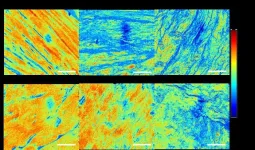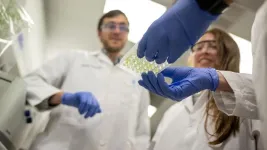(Press-News.org) “In high-income countries like the U.S. or Germany, farmers receive less than a quarter of food spending, compared to over 70 percent in Sub-Saharan Africa, where farming costs make up a larger portion of food prices,” says David Meng-Chuen Chen, PIK scientist and lead author of the study published in Nature Food. “This gap underscores how differently food systems function across regions.” The researchers project that as economies develop and food systems industrialise, farmers will increasingly receive a smaller share of consumer spending, a measure known as the ‘farm share’ of the food dollar.
“In wealthy countries, we increasingly buy processed products like bread, cheese or candy where raw ingredients make up just a small fraction of the cost,” adds Benjamin Bodirsky, PIK scientist and author of the study. “The majority of the price is spent for processing, retail, marketing and transport. This also means that consumers are largely shielded from fluctuations in farm prices caused by climate policies such as taxes on pollution or restrictions on land expansion, but it also underscores how little farmers actually earn.”
Examining the full food value chain to uncover climate policy impacts
To arrive at these conclusions, the team of scientists combined statistical and process-based modelling to assess food price components across 136 countries and 11 food groups. They studied prices of food both consumed at home and away from home. "Most models stop at farm costs, but we went all the way to the grocery store and even the restaurant or canteen,” says Chen. By analysing the entire food value chain, the researchers also provide new insights into how greenhouse gas mitigation policies impact consumers: “Climate policies aimed at reducing emissions in agriculture often raise concerns about rising food prices, particularly for consumers. Our analysis shows that long supply chains of modern food systems buffer consumer prices from drastic increases, especially in wealthier countries,” explains Chen.
Climate policies impact consumers differently in wealthy and poor countries
“Even under very ambitious climate policies with strong greenhouse gas pricing on farming activities the impact on consumer prices by the year 2050 would be far smaller in wealthier countries,” Bodirsky says. Consumer food prices in richer countries would be 1.25 times higher with climate policies, even if producer prices are 2.73 times higher by 2050. In contrast, lower-income countries would see consumer food prices rise by a factor of 2.45 under ambitious climate policies by 2050, while producer prices would rise by a factor of 3.3. While even in lower-income countries consumer price rises are less pronounced than for farmers, it would still make it harder for people in lower-income countries to afford sufficient and healthy food.
Despite food price inflation, poor consumers do not necessarily need to suffer from climate mitigation policies. A previous study by PIK (Soergel et al 2021) showed that if revenues from carbon pricing were used to support low-income households, these households would be net better off despite food price inflation, due to their higher incomes.
“Climate policies might be challenging for consumers, farmers, and food producers in the short term, but they are essential for safeguarding agriculture and food systems in the long run,” says Hermann Lotze-Campen, Head of Research Department “Climate Resilience” at PIK and author of the study. “Without ambitious climate policies and emission reductions, much larger impacts of unabated climate change, such as crop harvest failures and supply chain disruptions, are likely to drive food prices even higher. Climate policies should be designed to include mechanisms that help producers and consumers to transition smoothly, such as fair carbon pricing, financial support for vulnerable regions and population groups, and investments in sustainable farming practices.”
Article
David Meng-Chuen Chen, Benjamin Bodirsky, Xiaoxi Wang, Jiaqi Xuan, Jan Philipp Dietrich, Alexander Popp, Hermann Lotze-Campen (2025): Future food prices will become less sensitive to agricultural market prices and mitigation costs. Nature Food. DOI: 10.1038/s43016-024-01099-3
END
Growing divide: Agricultural climate policies affect food prices differently in poor and wealthy countries
2025-01-03
ELSE PRESS RELEASES FROM THIS DATE:
New approaches against metastatic breast cancer: mini-tumors from circulating cancer cells
2025-01-03
Tumor cells circulating in the blood are the “germ cells” of breast cancer metastases. They are very rare and could not be propagated in the culture dish until now, which made research into therapy resistance difficult. A team from the German Cancer Research Center (DKFZ), the Heidelberg Stem Cell Institute HI-STEM* and the NCT Heidelberg** has now succeeded for the first time in cultivating stable tumor organoids directly from blood samples of breast cancer patients. Using these mini-tumors, the researchers ...
Loneliness linked to higher risk of heart disease and stroke and susceptibility to infection
2025-01-03
Interactions with friends and family may keep us healthy because they boost our immune system and reduce our risk of diseases such as heart disease, stroke and type 2 diabetes, new research suggests.
Researchers from the UK and China drew this conclusion after studying proteins from blood samples taken from over 42,000 adults recruited to the UK Biobank. Their findings are published today in the journal Nature Human Behaviour.
Social relationships play an important role in our wellbeing. Evidence increasingly ...
Some bacteria evolve like clockwork with the seasons
2025-01-03
Like Bill Murray in the movie “Groundhog Day,” bacteria species in a Wisconsin lake are in a kind of endless loop that they can’t seem to shake. Except in this case, it’s more like Groundhog Year.
According to a new study in Nature Microbiology, researchers found that through the course of a year, most individual species of bacteria in Lake Mendota rapidly evolved, apparently in response to dramatically changing seasons. Gene variants would rise and fall over generations, yet hundreds of separate species would return, almost fully, to near copies of what they had been genetically prior to a thousand or so generations of evolutionary pressures. (Individual microbes ...
New imaging technique offers insight into Achilles tendon injury recovery
2025-01-03
Achilles tendon injuries are common but challenging to monitor during recovery due to the limitations of current imaging techniques. Researchers, led by Associate Professor Zeng Nan from the International Graduate School at Shenzhen, Tsinghua University, have applied Mueller matrix polarimetry, a non-invasive imaging method, to more accurately observe and evaluate the healing of Achilles tendon injuries. This technique offers unique insights by capturing the subtle changes in tendon tissue without needing labels or dyes, allowing for more natural tissue characterization.
The study used Mueller ...
Bereavement science researcher provides insights on parasocial grief
2025-01-03
MIAMI, FLORIDA (Jan. 2, 2025) – Many people are surprised by the intensity of their response when a well-known person dies, and their feelings of sadness may last longer than they expect. In fact, that sadness and grief can be intense, and preliminary research suggests that grief after the death of a public figure looks very similar to grief over our personal relationships and can have comparable levels of intensity.
Wendy Lichtenthal, Ph.D., a bereavement science researcher, is available to discuss “parasocial grief” – that which occurs when a celebrity, political ...
New research aims to improve bridge construction in Texas
2025-01-02
A groundbreaking method for bridge construction is set to enhance performance, reduce construction time, and cut costs for future bridges across Texas.
Dr. Kinsey Skillen, assistant professor in the Civil and Environmental Engineering Department at Texas A&M University, was named Principal Investigator (PI) of the Texas Department of Transportation (TxDOT) research project titled “Develop/Refine Design Provisions for Headed and Hooked Reinforcement.”
The 42-month project, which received nearly $1 million in funding, is a joint effort between the Texas Transportation Institute and the University of Texas at San Antonio (UTSA) exploring more efficient methods ...
These bacteria perform a trick that could keep plants healthy
2025-01-02
To stay healthy, plants balance the energy they put into growing with the amount they use to defend against harmful bacteria. The mechanisms behind this equilibrium have largely remained mysterious.
Now, engineers at Princeton have found an answer in an unexpected place: the harmless, or sometimes beneficial, bacteria that cluster around plants’ roots.
In an article published Dec. 24 in the journal Cell Reports, researchers showed that some types of soil bacteria can influence a plant’s ...
Expanding the agenda for more just genomics
2025-01-02
Genomics is being integrated into biomedical research, medicine, and public health at a rapid pace, but the capacities necessary to ensure the fair, global distribution of benefits are lagging. A new special report outlines opportunities to enhance justice in genomics, toward a world in which genomic medicine promotes health equity, protects privacy, and respects the rights and values of individuals and communities.
The report, “Envisioning a More Just Genomics,” is a collaboration between ...
Detecting disease with only a single molecule
2025-01-02
UC Riverside scientists have developed a nanopore-based tool that could help diagnose illnesses much faster and with greater precision than current tests allow, by capturing signals from individual molecules.
Since the molecules scientists want to detect -- generally certain DNA or protein molecules -- are roughly one-billionth of a meter wide, the electrical signals they produce are very small and require specialized detection instruments.
“Right now, you need millions of molecules to detect ...
Robert McKeown recognized for a half century of distinguished service
2025-01-02
NEWPORT NEWS, VA – For nearly half a century, Robert D. “Bob” McKeown has probed nuclear particles and educated rising generations of physicists. Now, the former deputy director for science at the U.S. Department of Energy’s Thomas Jefferson National Accelerator Facility is being honored for his outstanding career contributions with the 2024 American Physical Society’s Division of Nuclear Physics (DNP) Distinguished Service Award.
McKeown is recognized for his work in experimental physics and his extensive leadership in the broader ...





